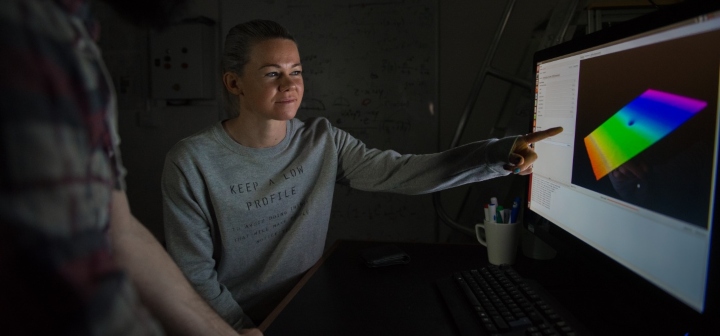Mathematical Sciences

As a maths graduate, you will be equipped with a range of numerical, analytical and problem-solving skills that are highly valued by employers and will enable you to progress into a wide range of employment sectors.
As well as being able to speak the fundamental language of science and engineering, those with advanced mathematical skills have the ability to understand, analyse and interpret complex data, which is invaluable in many employment sectors.
The job market for mathematicians
The common language of mathematics has become increasingly important across the employment sector. Maths graduates benefit from opportunities to work in a range of sectors, and the flexibility to change career directions as required. The most popular employment sectors nationally for maths graduates to progress into are:
- Business, finance and HR professionals (39.9%)
- IT professionals (19.7%)
- Education professionals (13.2%)
- Clerical, secretarial, numerical clerks (8%)
Source: Source: What do technology, engineering and maths graduates do? (Luminate 2021)
However, career opportunities are continually expanding. In particular, the roles of data analyst and data scientist have recently emerged strongly in a range of both new and traditional businesses in which there is greater emphasis on algorithmic approaches arising from digital technology, the use of large data sets, security, communication and computer-based technology.
Computer-based mathematical modelling of commercial and industrial processes is of vital importance to many employers - the use of such models usually requires good mathematical insight and the development of these models can require advanced mathematical skills.
What skills will I gain during my degree?
The Prospects website outlines the following skills you can expect to gain from a maths degree:
- investigating, analysing and interpreting data, finding patterns and drawing conclusions
- developing programming and data analysis skills
- approaching problems in an analytical and rigorous way, formulating theories and applying them to solve problems
- dealing with abstract concepts
- presenting mathematical arguments and conclusions with accuracy and clarity
- developing advanced numeracy and analysing large quantities of data and logical thinking.
You also develop key general skills that all employers expect, including:
- communication skills
- time management
- organisational skills
- working methodically and accurately
- decision-making skills
How can I develop my skills and experience during my degree?
Module choices
Consider taking advantage of modules and activities within the school which will help develop your employability skills such as the PASS mentoring scheme and Data Analysis and Modelling, Communicating Mathematics and Vocational Maths modules.
Work experience
Summer internships are also a great way to gain experience.
Nottingham Internships Scheme, for example, offers a range of local paid internships with companies in Nottingham, and other sources of vacancies are listed on our work experience pages.
Maths Year in Industry
You can now undertake a placement year as part of your degree at the end of your penultimate year of study. The placement can be aligned to your degree discipline or related to your career aspirations. Speak to a career adviser or your school for more information.
Research internships
The School of Mathematical Sciences run a summer research internship scheme.
Volunteering
There are lots of opportunities to volunteer locally.
Students' Union
Get involved in activities including volunteering and societies such as MathSoc. Students with an interest in business and finance could also join societies such as Enactus and NEFS.
Students in Classrooms
There are three initiatives which will give you the opportunity to work in a local educational setting. These initiatives support the academic attainment and raise the aspirations of primary and secondary pupils, whilst developing the skills and employability of those involved.
These are excellent opportunities for students considering teaching, youth work or community engagement as a career.
Nottingham Advantage Award
The Nottingham Advantage Award offers a range of modules to help you expand, develop and evidence your skills and experience during your time at university.
Many of our second and third year students complete one NAA module as part of the Maths PASS scheme and the summer research internship scheme.
Careers fairs and employer events
Attend sector specific careers fairs and employer events to find out more about career sectors and employers of interest.
What are the range of careers graduates enter and who employs them?
The roles and companies below are examples from the destinations of recent Nottingham maths graduates.
The Institute of Mathematics and its Applications (IMA) has a dedicated careers website for undergraduates and graduates.
Finance, banking and accounting
- Accountancy Graduate Scheme
- Actuarial Pricing Analyst
- Actuary Trainee
- Audit Associate
- Graduate Trainee Banking Consultant
- Trainee Chartered Accountant
Data, Statistics and analysis
- Credit Risk Modeller
- Data Analyst
- Graduate Analyst
- Statistical Officer
- Tax Specialist Trainee
- Teacher of Maths
Technology
- Cyber Security Associate
- Graduate User Interface Engineer
- Technology Analyst
- Trainee Developer
Others
- Maths teacher
- Maths tutor
- Amazon
- Barclays
- Capital One
- CQM
- Deloitte
- Direct Line
- Experian
- KPMG
- Hawsons
- HM Revenue and Customs
- Home Office
- IBM
- Isba
- Lloyds
- Massive Interactive
- PwC
- Towers Watson
What further study options do graduates go on to? Watch our webinar on PhD study
The courses below are examples from the destinations of recent Nottingham maths graduates.
Other postgraduate study
- MSc Statistics
- MSc Financial Mathematics
- PGCE Secondary Maths
Thinking about a PhD? How to get started and how to apply
In these two videos, Dr Judith Wayte from the University of Nottingham provides clear and wide-ranging advice on:
- how to get started: what to take into account, and how to gather relevant information
- on the application process and how to prepare for interviews
Login to SharePoint to watch the webinar
- Alumni: Email us to gain access to the webinar
Explore more...